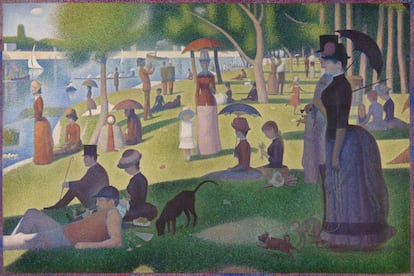Move over, Monday: Sunday is the new worst day of the week
Experts and social media users agree: the Sunday blues are real. Tedious obligations, repetitious chores and just plain boredom rob it of all its appeal; the proximity of a new work week doesn’t help, either


The hatred of Mondays is more than established in Western culture. Garfield the cat is the voice of millions when he laments about that allergy-like loathing that returns week after week and can only be overcome with an abundance of coffee and sleep. Entire novels have been dedicated to it, such as Odio los lunes (I Hate Mondays) by Vicente Trigo Aranda, as well as songs like Bob Geldof’s homicidal reverie I Don’t Like Mondays.
Universities — such as Flinders, in Australia — and consultants like Gallup have tried to endow the phenomenon with a rational basis related to factors such as sleep discontinuity or our brain’s strategies to cope with stress, and the American Journal of Preventive Medicine went a step further by stating that one is actually most likely to suffer a cardiovascular event on a Monday. Meanwhile, in 2005, a Sky Travel advertising campaign convinced us that one specific Monday, the third of January, is the most depressing day of the year.
However, it is also true that hating Mondays has become a rather trivial, fleeting matter; a familiar feeling that is washed away as soon as you take a shower and face reality again. In recent years, hate — at least for those lucky enough to have a stable job and the weekend off — has set its sights on Sunday.
Just take a look at this pair of twin Reddit threads. Mondays Are the Worst is little more than a display of routine, unconvinced animosity. By contrast, I Hate Sundays and I Think They’re Depressing is a masterpiece of refined hate; not to mention its successors, Sundays Are Worse than Mondays, I Hate Sundays, Does Anyone Hate Sundays and I Seriously Hate Sundays. Quora user Leslie Hancock, explains: “I hated Sunday till I was well into middle age.” He traces the roots of that hatred back to a childhood in which religious and family obligations, along with the ominous shadow of the impending Monday, “poisoned” the day for him.
The Guardian columnist Rachel Cooke has made one of the most eloquent attempts to define and explain this hate. “Not for nothing did John Osborne set the opening and closing scenes of his play Look Back in Anger on a Sunday,” she writes. “If you wanted to strangle England in 1956 — to wring the neck of its tedium and small-mindedness, its primitive habits and dreadful deference — there was no better place to start or to end.”
Osborne’s protagonist in Look Back in Anger verbalizes his disdain in one of the most memorable moments of the play: “God, how I hate Sundays! It’s always so depressing, always the same. We never seem to get any further, do we? Always the same ritual. Reading the papers, drinking tea, ironing. A few more hours, and another week gone. Our youth is slipping away.”
What better definition of that melancholic Sunday syndrome? A day in which leisure descends into tedium; in which an apparent lack of things to do is in fact the veil that conceals a deflated spirit. Cooke supports a revolutionary thesis: perhaps the Sundays blues made perfect sense in that England (and, by extension, in the entire Western Christian Europe of three-quarters of a century ago) in which Sundays meant closed pubs and shops, open churches and empty streets, all of which generated a premortuary atmosphere that led to anxiety over the inescapable futility of life.
However, in today’s world, Sundays are no longer a radical break from the rest of the week. We are no longer trapped in that logic of five days of work, one of voracious consumerism and immoderate distraction and another of rest, hangover, sanctimoniousness and boredom. We have alternatives. We can turn Sunday into another Saturday, or even into a healthy, industrious and sensible Wednesday.
How to cope with the Sunday blues
According to statistics, 76% of Americans and Canadians experience those inexplicable bouts of sadness known as Sunday syndrome with a certain frequency. What’s more, German and Swedish scientists suggest that Sunday, not Monday, is the saddest day of the week, and Friday, not Saturday, is the happiest. That, in the opinion of Australian psychologist Marny Lishman, could be because, being aware of our own mortality and the transience of time, “we live less in the present than projected into the immediate future.”
On Friday, even if it is a working day, we particularly enjoy the imminence of freedom and leisure; it is all about the expectation. Meanwhile, on Sunday we are tormented by the proximity of Monday, with the return to routine and unpleasant obligations that it implies — as well as the realization that Friday’s expectations did not materialize, as they rarely do.
The syndrome is very difficult to deal with. Luckily, specialists in health and psychological well-being such as Robert Half offer possible antidotes for the Sunday blues; tricks like conceiving your weekend as a compact whole and planning it all from Friday afternoon in order to fill it with events, as well as looking for “feel-good” activities for Sunday, such as yoga or jogging.
Have boring chores to do? Get them out of the way on Saturday. Pay your bills, do your washing and call your parents before Sunday arrives. And yes, relax, sleep well, read a book, watch a good movie and think about all the positive events that will take place the following week.
Lishman also believes in the virtues of resorting to a certain mental discipline as a remedy against “melancholy and pre-depressive states.” If none of the above works for you, consider for a moment Rachel Cooke’s alternative recipe: we no longer live in 1950s Europe, so go out into the streets, enjoy your time of leisure and look for something stimulating to do; without a doubt, you will find it. Maybe that way we can restore the balance of the Force and refocus our hatred on the day that has made the most historical efforts to deserve it: Monday.
Sign up for our weekly newsletter to get more English-language news coverage from EL PAÍS USA Edition
Tu suscripción se está usando en otro dispositivo
¿Quieres añadir otro usuario a tu suscripción?
Si continúas leyendo en este dispositivo, no se podrá leer en el otro.
FlechaTu suscripción se está usando en otro dispositivo y solo puedes acceder a EL PAÍS desde un dispositivo a la vez.
Si quieres compartir tu cuenta, cambia tu suscripción a la modalidad Premium, así podrás añadir otro usuario. Cada uno accederá con su propia cuenta de email, lo que os permitirá personalizar vuestra experiencia en EL PAÍS.
¿Tienes una suscripción de empresa? Accede aquí para contratar más cuentas.
En el caso de no saber quién está usando tu cuenta, te recomendamos cambiar tu contraseña aquí.
Si decides continuar compartiendo tu cuenta, este mensaje se mostrará en tu dispositivo y en el de la otra persona que está usando tu cuenta de forma indefinida, afectando a tu experiencia de lectura. Puedes consultar aquí los términos y condiciones de la suscripción digital.








































